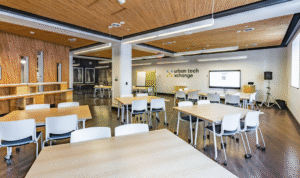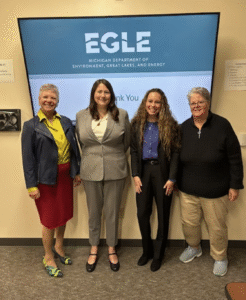
- Kim Kisner
- Community
- 04/04/2023
The 2022 Michigan Conservation Results Report Outlines Connectivity in Conservation Efforts Across the State
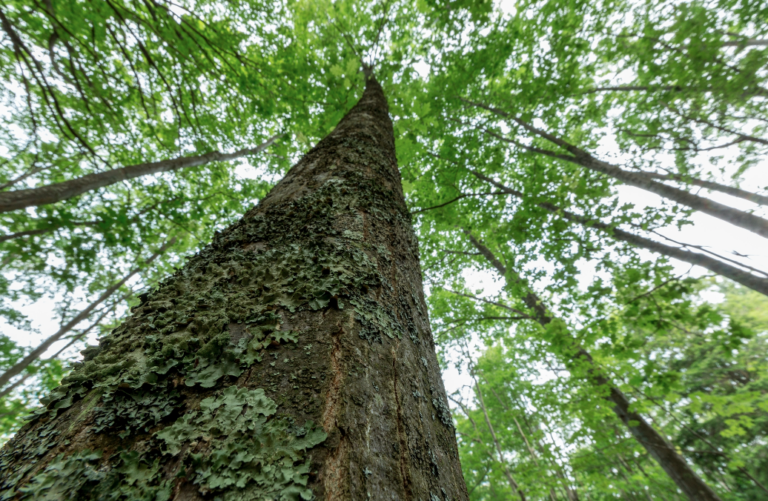
The Nature Conservancy in Michigan recently released its 2022 Michigan Conservation Results Report that outlines the work it is doing to tackle conservation issues that range from climate change to biodiversity loss. With 32,000 members, a staff of 55+, 25 trustees, and many contributors, partnerships, and donators, 32,541 acres of land became protected last year, totaling 437,000 acres to date.
We spoke to Associate State Director Patrick Doran about some of the key initiatives outlined in the report.
Q: A recent acquisition of land in the Keweenaw Peninsula nearly doubled the peninsula’s protected lands, which provide habitat for many iconic species. How does this impact the state and Southeast Michigan?
A: It’s a great question – how the work we are doing in Northern Michigan impacts the entire state and beyond – and I want to give some context around that. TNC is the world’s largest conservation organization with almost 6,000 employees around the world. When we have a project in place, we think not only about executing that project with boots on the ground but also think about how it impacts the entire system. We lift our heads and assess the impact on the region, the Great Lakes, the state, and the world. We think about how it will affect the economy, the air, the climate, people’s quality of life, and more.
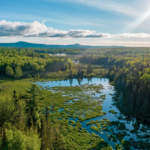
Securing the 30,000-plus acres in Keweenaw is amazing for us. I also want to note that there are several partners and entities involved in these efforts. TNC could never have done this alone.
The opportunity to move land into conservation at this scope just does not exist in too many places in the US. The land has been under traditional timber ownership and management. We see TNC as a temporary holder – maybe three to five years – and eventually, we’d like to see the land secured by the state and local townships and municipalities and counties. We believe local ownership achieves the best conservation outcomes. So, we will ensure it’s protected, and that the forest is under a sustainability management plan, so that the conservation status improves from what it was, all the while making sure that it remains available for public use and recreation.
This project truly sits at the intersection of economic development, nature, and sustainability, and there are several ways that it connects to other parts of the system.
Relating this to the Southeast Michigan area, ecologically, in the spring Keweenaw is one of the most important migration areas in the Midwest. Millions of hawks, songbirds, and more move from South America, hit the Great Lakes to the Detroit corridor up to the U.P., and the majority fly up the Keweenaw Peninsula before making the daunting trip across Lake Superior. Southeast Michigan is an important stop in their migration process. So, there is this interesting species connection between the Lower Peninsula and the U.P.

The connection also ties into the economy and also climate change. Those forests are places where we can store carbon through the growth and management of trees and also keep the industry intact. It’s a careful balance. Sequestering carbon will help meet climate change goals and this impacts the whole state. We have robust timber and water industries throughout the state and in Southeast Michigan, and that’s very important to our economy.
Another connection this project represents is with businesses across the state. TNC is exploring the most effective ways to work with companies across the state in their quest to meet their sustainability goals. The forests can support these companies in this quest, and the companies are in turn investing in the forests.
TNC also has a partnership with the Michigan Manufacturers Association. The goal is to help educate and assist small and medium-sized businesses with sustainability planning. We offer a suite of workshops for these manufacturers and companies. Two good examples are Steelcase and Consumers Energy – we began working with both companies last year.
Q: According to the report, all 47,000 acres of TNC’s forest reserves in Michigan are now FSC®-C008922 certified. What does this mean?
A: What FSC certification does is up the level of sustainability management and make sure all are adhering to best practices in terms of how many trees are cut, frequency of cutting, how streams and lakes are impacted, etc.
This makes the whole system healthier. Again, timber is a huge part of the state’s economy, and it’s important to manage this industry in a way that is thoughtful and promotes the ability to sequester carbon. The focus is to achieve our ecological goals and at the same time keep land in the timber industry.
We are also involved in working with the manufacturing industry in Southeast Michigan and across the state to ensure they are actively using more sustainably produced timber. When the supply chain demands this, it becomes a more virtuous cycle.
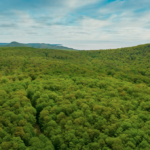
Relating this to the construction industry, there is also a movement in place to use cross-laminated timber or mass timber, which offers more long-term carbon storage in comparison to using cement or other building materials. The DNR and Michigan State University are working on reinvesting this back into the building and construction process.
Q; Regarding our parks and waterways, the report references Public Act 53 of 2022, saying that ultimately $2.3 billion of the historic state funding included in the act was designated for the improvement of Michigan’s water infrastructure, with an additional $450 million for state and local parks. What is TNC’s role in these improvements?
A: TNC operates at a policy and system level to impact our parks and water across the state. Michigan sits in the middle of one of the world’s largest freshwater systems, so we have to protect that. We work to promote healthy infrastructure and programs that support investing in that.
Regarding the importance of maintaining our parks and nature within urban areas, I was at a conference last year in Detroit and began asking businesses why they think investing in nature is important. Of course, I heard several reasons, but every one of them tied it back to attracting and maintaining employees. If we invest in nature, we’ll draw more people here and have a wonderful place to live and work for all. Detroit’s award-winning riverfront is a great example of this.
Q: In terms of renewable energy, TNC is involved in smart siting of wind and solar installations. What does this mean exactly?
A: Across North America, TNC executes a strategy for renewable energy siting. To meet climate goals, there must be an investment in renewable energy, but if windmills and structures are poorly designed and operated, they can have a detrimental effect on nature. We offer tools for developers and buyers to avoid bad siting and to have the least impact on nature. For example, windmills should be buffered from waterways to keep birds, bats, and insects safe.
Q: Regarding Detroit area stormwater management, the Eastern Market Stormwater Management Network Plan has begun and TNC played a big part in developing this. Where does it stand now?
A: TNC is working with businesses now to follow that plan, meet requirements, and navigate green infrastructure development. We are also helping some financially.
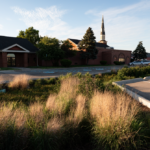
Q: TNC also worked on a Green Stormwater Infrastructure Study supported by the Fred A. and Barbara M. Erb Family Foundation – to what end?
A: We are on the cusp of finishing this. We worked with Grand Valley State University on an analysis of the cost and benefits of green infrastructure versus grey. There is a misconception of sorts that grey stormwater management is less expensive than green. What we found is that green infrastructure is comparable in price.
As part of this study, we talked to designers and architects to ask what their barriers to entry are in terms of promoting green infrastructure. One was cost, which we hope now to mitigate, and the other is simply that clients and developers don’t think about it or know how to adopt it. So, we have presented some case studies and examples and are working on educating and engaging people on this.
Q: Another initiative TNC is involved with in the Detroit area is the Resilient Repairs for Homes program. What is this?
A: We are taking some of the revenue from the forest carbon markets to then invest back into homes and green infrastructure in the city. The fact is, many of the homeowners located where carbon emissions are the worst are the areas that are socioeconomically challenged. These are the areas that are also overly impacted by flooding, severe weather, and carbon emissions. So, we are investing carbon revenue to help make these homes and neighborhoods more resilient so they can deal with floods and install energy efficiencies. We are trying to close the loop and offset areas in Detroit using forest land hundreds of miles away. This is currently focused on the Eastern Market District.
Be sure to subscribe to our newsletter for regular updates on sustainable business practices in and around Detroit.
Kim Kisner
- All
- Business
- Community
- Education
- Events

Citizen Robotics is a Detroit-based nonprofit that advances the use of robotics and digital manufacturing in residential construction, focusing on improving productivity, sustainability, and long-term affordability. Best known for its early work in 3D-printed housing, it explores how alternative construction methods and new financial models can reduce material waste, lower lifetime operating costs, and enhance the resilience of homes. SBN Detroit interviewed Tom Woodman, founder and president of...
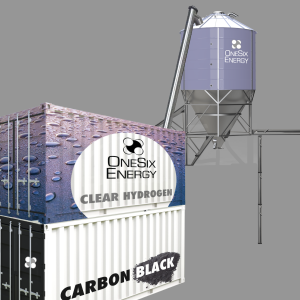
Detroit-based OneSix Energy is a clean-energy technology company focused on advancing a lower-carbon approach to hydrogen production. Headquartered at Newlab in Detroit, the startup is developing a proprietary methane pyrolysis system designed to produce hydrogen without carbon dioxide emissions, while also generating solid carbon as a co-product. SBN Detroit interviewed with cofounder Stefan Sysko about the company’s origins, its approach to hydrogen production, and why Detroit is positioned...
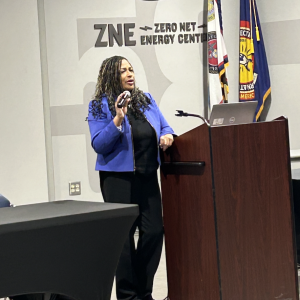
Regina Strong serves as Michigan’s first Environmental Justice Public Advocate, leading the state’s Office of the Environmental Justice Public Advocate. Her role focuses on addressing environmental justice concerns raised by communities, helping residents navigate environmental systems, and working across state agencies to improve equity in environmental decision-making. SBN Detroit interviewed Strong about the challenges communities are facing across Michigan and what environmental justice work looks like in practice....





